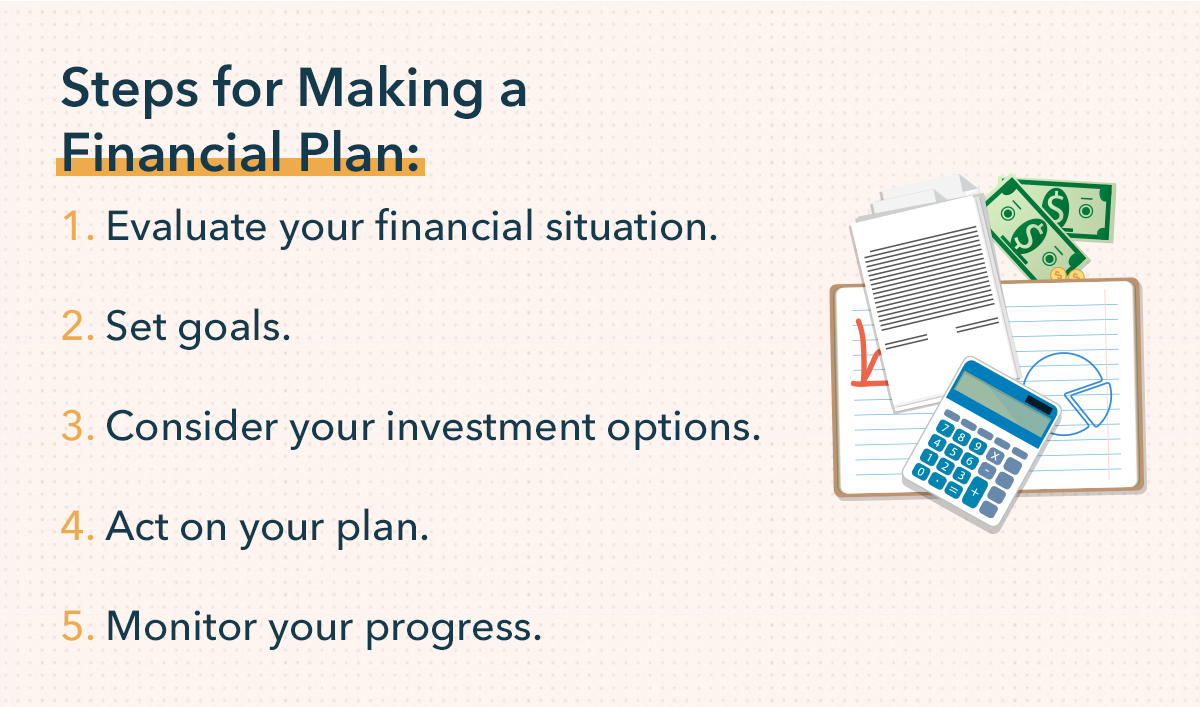What is a financial plan? Definition, Suggestion and Examples
What is a financial plan?
A financial plan acts as a guide for your money and helps you achieve your goals. Financial planning is about building a way to help people achieve their financial goals. You can do financial planning on your own or with the help of a professional.

Save more, spend smarter and grow your money

Financial planning is a step-by-step strategy to accomplish your life goals. A financial plan helps you to go through the journey of your life. It enables you to control your expenses, income and investments to manage your finances. Financial planning guides you towards making practical decisions about spending and saving, so that you can achieve stability and reach your goals.
Money is the cornerstone of our livelihood, whether it’s making sure we have food on the table and a roof over our heads, or saving for retirement. In such a situation, it is very important to manage your money wisely. This is where the practice of financial planning comes in.
Financial planning can help you reach your financial goals, which include a bigger house, a new car, better career training, a family vacation abroad, higher education for your children, and most importantly, while working and Including being independent after retirement.
Successful financial planning requires identifying and setting priorities, referred to as money management. If you’re not sure where to start, don’t worry, we’ve got you covered. Keep reading to learn the basics of financial planning, or use the links below to jump straight to a specific section.
financial plan definition
By definition, financial planning is the process of assessing your current financial situation and taking that information to manage your money in a way that helps you achieve your goals and set yourself up for a successful future. .
Financial planning is a multi-step process that requires you to evaluate the big picture of your financial circumstances. You have two options when making a financial plan, you can do it yourself, or you can take the help of a professional financial advisor. Either way, financial planning is an essential aspect of wealth management and long-term financial security.
What are the benefits of financial planning?

There are many benefits of financial planning. It allows you to:
- increase your life savings
Part of any solid financial plan is creating a strategy for your savings. When you make a financial plan, you get a good understanding and insight about your income and expenses. You can track your costs and reduce them intentionally. With this information, you can then decide how much discretionary income you need to save or how you can increase your current budget allocation to see how much you can save.
- improve your standard of living
Many people think they will have to lower their standard of living if they are trying to make better financial decisions. Conversely, you usually don’t need to compromise your lifestyle with a good financial plan. Your goals are pretty much achievable while remaining in moderate comfort.
Creating an emergency fund is an important component of financial planning. For many people, the goal is to have at least six months of your monthly earnings set aside for emergencies. That way, when an unexpected expense comes up or you find that your financial circumstances have changed significantly overnight, you won’t have to worry about scrambling to come up with the money you need. The emergency fund will help you handle various expenses on time and with very little stress.
With enough money readily available, you can cover your monthly costs, invest in your future dreams and goals, and spend a little on yourself and your loved ones without worrying about money. Financial planning will help you organize your money faster and enjoy the peace of mind that your bases are covered. Don’t fret if you’re not quite there yet—all on time. Financial peace is not far off once you set your foot on the financial planning route.

How do I make a financial plan?
For financial planning to be effective, it is important to follow the right process. To have a good financial plan, make sure that:
- Evaluate your current financial situation
To get started, you need to have a good understanding of your current finances, especially when it comes to:
- Expense
- revenue
- loan of
- Investment
- Savings
Completing this first step will give you a good understanding of the state of your finances and ways to improve it.
- Write down your financial objectives
Write down the various financial goals you want to achieve—both short term and long term. Make sure your goals are clear and specific.

For example, here are some attainable goals:
- “I want to buy a car in the next three years”
- “I want to buy a house in the city in the next two years.”
- “I’ll save 10% of my income to go toward the down payment this year.”
The more specific your goals, the better you can plan for them. These goals will act as a guide for how you plan and allocate your money.

- Explore different investment opportunities
There are many investment possibilities available to the investors. You can choose from almost thousands of projects and schemes in the mutual fund market. Different investment avenues allow investors to meet different goals. For example, stock or equity funds are suitable for long term plans like retirement planning, education etc. If you are interested in a fairly stable income and risk aversion, you may want to invest in debt mutual funds. Similarly, ELSS (Equity Linked Savings Scheme) fund is ideal for saving tax. Financial experts have emphasized the importance of mutual funds when it comes to investing. Investing regularly in these funds over a long period of time can help you meet your goals and objectives.
- take the right plane
When creating a financial plan, you should take several factors into account, including:
- Your age
- target
- risk tolerance
- current investment
- retirement plans
Financial plans are highly customized to your situation, so you shouldn’t follow a one-size-fits-all approach. Instead, take recommendations and adapt them to your circumstances. It may take some time and effort to figure out all the elements of your financial plan, but doing your due diligence will only benefit you in the long run.
- Monitor your financial plan continuously
Financial planning doesn’t just stop once you put your plan into action. You need to track progress towards your goals and may need to pivot as your circumstances and desires change. Here are a few important things you should keep an eye on to see how your plan is working out for you:
- how much have you saved
- How close are you to reaching your goals?
- How is your investment performing?
- where are you falling short
Often things like big changes in life affect our financial planning and require us to go back and reevaluate. For example, your financial priorities may change if you have children, so you will need to adjust expenses and objectives accordingly. Or, if you decide you want to make a major purchase — such as real estate — you will need to adjust your previous plan to help you achieve that goal.

What are the key elements of a financial plan?
Financial plans don’t have a set structure or format, although the right people focus on the same things. Your financial plan should include the following key elements, regardless of the approach used to create it.
- Goals and Objectives: These should be documented on a priority basis and should be measurable, specific and practical.
- Identifying Weaknesses: This includes analyzing the strengths and weaknesses of your current situation to understand what issues need to be addressed.
- Risk Management: This not only means you should consider what kind of investments you can make right now but also other risk planning like getting insurance that covers your financial base. You should consider your life, homeowners, disability, health, collision and comprehensive insurance.
- Prioritizing everyday needs: Before you prioritize your long-term financial well-being, make sure you pay for yourself first and that your everyday needs are met.
- Retirement, education and special needs: Careful consideration should be given to education, retirement and other special needs. Funding plans as well as financial assessments should be planned for these needs.
- A budget: This will show the income from all sources and expenses that are regularly occurring or recurring. Update your budget to track progress toward your goals and determine changes in your financial situation.
- Investment plan: An analysis of your investments should determine whether the growth, earnings and diversification of the portfolio is stable.
- Estate Planning: Your financial planning should include reviewing all of your properties to eliminate or reduce your estate tax exposure.
- Assumptions: This includes rate of return on investment, rate of inflation, tax bracket, Remaining years of work, and longevity. Review these from time to time against your financial plan and adjust accordingly.
With these elements in mind, you will have the right foundation to build a fruitful financial plan.
7 Tips for Financial Planning
Below are some tips on how to start saving and investing in your future:
1. Track your spending patterns for better money management and improving your finances.
2. Make a reasonable monthly budget and stick to it.
3. Make big purchases in cash to avoid credit card debt. While it’s convenient to use, it’s easy to overlook that it’s real money, and you lose track of how much you’ve spent.
4. Build up your savings for unforeseen complications that may come up and have a major impact on your financial stability.
5. Pay your bills on time to avoid late fees and dings on your credit profile.
6. Cancel your unnecessary monthly subscriptions to mobile apps or streaming sites so you can save money by avoiding recurring charges.
7. Start an investment strategy, even if your ability to invest is limited. A small investment can help you utilize your hard earned money to generate more income.
When should I hire a consultant to assist with financial planning?

Financial advisors and financial planners are licensed professionals who guide investors in making appropriate investment choices. They also help with retirement planning, estate planning and taxation. Financial advisors can be helpful when you are overwhelmed, confused or uneducated about financial management. Most people struggle to imagine the day they’ll need their retirement, with little planning for it, so professional advice can be very convenient.
final notes
A financial plan is not a document; It is a tool to track your development. Once you figure out your financial plan, remember that you don’t want to set it and forget it. It is always a good idea to review your financial plan from time to time, especially if there has been a major change in your financial circumstances or lifestyle.
If the idea of managing a financial plan sounds a bit overwhelming, don’t stress. The Mint app allows you to keep track of everything from your purchases and investments to personal budgeting and savings goals. Get started with the free app to help you stay on track with your financial plan and set yourself up for a stable future.
Read more about financial tips and planning:
Access essential personal finance tips in this guide.
Use these free financial calculators to improve your financial health.
Find out how a financial advisor can help with your financial health.
Learn more about online financial advisor options.






